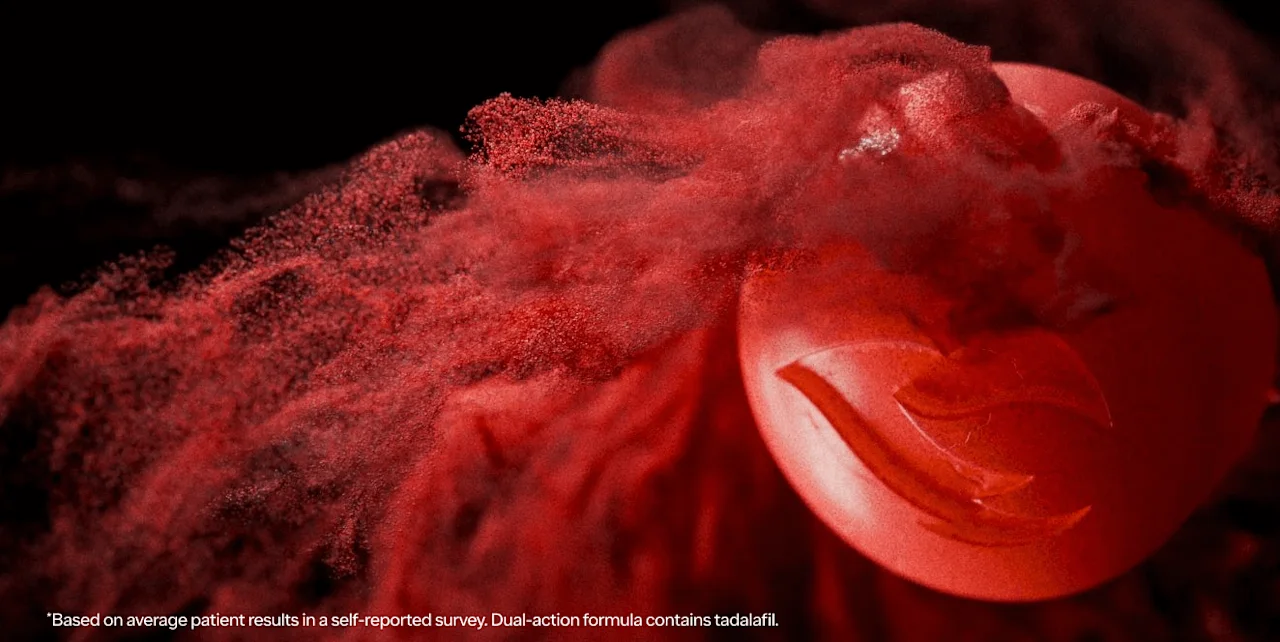Key takeaways
There is no set age at which men stop getting hard. Erectile dysfunction (ED) can happen at any age and is not an inevitable part of aging.
While ED becomes more common with age, your physical health, mental health, and lifestyle habits can also play a role in developing the condition.
Effective treatments for ED range from oral medications and lifestyle changes to medical devices and more.
Here's what we'll cover
Key takeaways
There is no set age at which men stop getting hard. Erectile dysfunction (ED) can happen at any age and is not an inevitable part of aging.
While ED becomes more common with age, your physical health, mental health, and lifestyle habits can also play a role in developing the condition.
Effective treatments for ED range from oral medications and lifestyle changes to medical devices and more.
As the saying goes, “aging is a privilege.” Yet, most people often associate getting older with negatives: wrinkles, a slower metabolism, and declining sexual performance. That last one may be more fiction than fact, though—which raises the question, “At what age does a man stop getting hard?”
The answer is simple: there isn’t one. Erectile dysfunction (ED) does become more common with age, but there’s no magic number when erections just stop—plus, age isn’t always the culprit of down-there difficulties.
Ahead, we take a closer look at erectile dysfunction—both in terms of age and in general—and break down the causes and treatments you should know, no matter how many trips around the sun you’ve taken.
At what age does a man stop getting hard?
There is no specific age at which men stop getting hard. Erectile dysfunction—difficulty getting and keeping an erection sufficient enough for satisfying sex—can happen at any age. That said, it is more common the older you get. By age 40, about 40% of men experience reduced sexual function or ED. That risk increases by about 10% for each decade of life—a 50% chance in his 50s, a 60% chance in his 60s, and so on.
But that does not mean a man in his 20s can’t experience ED. In fact, research suggests that about 18% of men experience ED before age 25. Altogether, experts estimate that at least 30–50 million American men have experienced ED—a number that highlights just how common the condition is, regardless of age. While age increases your risk of ED, various factors can contribute to increased risk of ED, from stress and smoking to physical conditions like heart disease and diabetes.
One study attempted to parse out how much of a role age plays in causing ED, compared to other health conditions like hypertension (high blood pressure), obesity, and diabetes. The researchers found that men who have several other health conditions have the same risk of ED as someone without those conditions who is up to 25 years older. The risk of having ED is about 20% for a healthy 50-year-old man, and 68% for a healthy 75-year-old. For men with other health conditions in the same age group, though, that risk increases to 41% and 85%, respectively.
So age is a risk factor for ED, but there are a lot of others that play a substantial role in determining your risk
ED is not an inescapable natural part of aging that older men just have to accept and learn to live with, and, again, ED can happen at any age. It's always worth addressing with a healthcare provider, as the condition can be a sign that something larger is going on with your health.
Causes of ED
The list of potential causes of ED is a long one, ranging from physical causes like obesity and high cholesterol to anxiety, depression, and lifestyle factors like smoking and binge drinking.
Physical causes of ED
Multiple health conditions may increase your risk of ED, including:
Blood vessel problems including heart disease. The most common cause of ED in men over 50 is atherosclerosis, or hardening of the arteries, resulting in heart disease or blood flow issues in other areas of the body. As men age, the linings of their arteries become less flexible. That means they don't expand as easily to let blood flow to where it needs to go (like to the penis to produce an erection). Plaque, caused by high cholesterol, can also build up in the arteries, restricting blood flow to the penis.
Hypertension. Also known as high blood pressure, hypertension means that blood pumps through blood vessels more forcefully than it should, potentially damaging and narrowing the blood vessel walls. This condition can lead to heart disease and stroke. About one in three men with hypertension also have ED.
Diabetes. High blood sugar associated with diabetes can also damage the walls of blood vessels, impeding blood flow. Men with diabetes are 3.5 times more likely to have ED.
Stroke. A stroke, loss of blood flow to areas of the brain, can create neurological damage that can contribute to ED.
Cancer. A variety of physical and psychological issues related to cancer symptoms, surgery, and treatment can contribute to ED.
Obesity. Men with obesity are 50% more likely to have ED than men of normal weight. Obesity can cause inflammation that can affect testosterone levels and erectile function.
Hypogonadism. Defined as an abnormally low level of testosterone in the blood, hypogonadism can also reduce the rigidity of your erections. About one-third of men with ED also have low T. Hypogonadism is also more common among men with diabetes, a condition that can further contribute to ED.
ED can also result from physical conditions in which the body's nerves are damaged or don't function properly, such as nerve and spinal cord injuries and multiple sclerosis.
Psychological causes of ED
ED certainly isn’t "all in your head"—and neither are mental health conditions, for that matter. But depression, anxiety disorders, and issues like relationship problems and performance anxiety can all contribute to ED.
Here’s a closer look at the psychological causes of ED:
Anxiety. About one in four men with ED or premature ejaculation have anxiety. Having anxiety beforehand can also heighten feelings of performance anxiety related to ED.
Depression. Men with depression are 40% more likely to have ED. ED can also worsen symptoms of depression and lower libido (sex drive).
Stress. Even without a diagnosed mental health condition, living under high levels of stress can negatively affect erectile function. Think of it this way: when your brain is in flight-or-flight mode, such as when you’re dealing with constant pressure at work or ongoing tension with your family, it’s not exactly prioritizing arousal or blood flow to the penis.
Other lifestyle risk factors for ED
ED can also occur as a side effect of certain medications, including antidepressants, opioids, and drugs like beta-blockers that treat high blood pressure. If you're experiencing ED, be sure to tell a healthcare provider about all the medications you're taking. They might be able to adjust your dose or substitute another medication.
Additional lifestyle factors that can contribute to ED include:
Lack of physical activity
Poor diet
Alcohol abuse or overuse (having more than two alcoholic drinks per day)
Smoking cigarettes or marijuana
Drug use (including tobacco products and recreational drugs)
How to treat ED
The good news is that ED is, according to researchers, “almost always treatable.” It usually comes down to two things: addressing the underlying cause of ED and finding a treatment that works for you. There is a variety of treatment options for ED, from oral medications like Viagra and Cialis to lifestyle changes like losing weight and quitting smoking. Below, we take a look at some of the most popular options for treating ED.
ED medications
The most commonly prescribed ED treatment is a group of oral medications known as phosphodiesterase type 5 (PDE5) inhibitors. These drugs work in part by relaxing blood vessels and increasing blood flow to certain areas of the body, including the penis. Not only are they considered safe for most men, but they’re also highly effective, successfully addressing ED symptoms in over 75% of cases. Keep in mind that you must be aroused in order for these medications to work.
Common PDE5 inhibitors prescribed for ED include:
Stendra (avanafil)
Vardenafil (the generic form of now-discontinued Levitra)
If you're not into taking pills, you can still access the active ingredients in these medications through other forms—that is, of course, as long as you have a prescription from a healthcare provider.
Ro Sparks combines sildenafil and tadalafil (the active ingredients in Viagra and Cialis, respectively) into a sublingual lozenge that dissolves under your tongue for fast-acting effects.
Daily Rise Gummies are fruit-flavored gummies containing 7 mg of tadalafil that are designed to be taken daily to deliver long-lasting benefits.
Although these two alternative options haven’t been specifically approved by the US Food and Drug Administration (FDA), their active ingredients are individually cleared by the FDA to treat ED.
Lifestyle changes
Your erections will be best when you're healthy. Making simple lifestyle changes such as getting more exercise, eating a healthy diet, quitting smoking and recreational drugs, and limiting your alcohol consumption might be enough to improve ED and your sexual health.
Increasing your physical activity. Regularly exercising, particularly through moderate to vigorous aerobic activity, can help prevent and manage ED. Research shows that consistent physical activity may lower the risk of ED by more than 20% in men over 40. This is likely because exercise improves blood flow throughout the body. It also supports weight management and overall heart health—two factors that can play a key role in improving erectile function.
Eating a balanced diet. Following a nutritious eating plan can play an important part in promoting erectile function. This typically means packing your plate with erection-friendly foods, such as leafy greens, peppers, tomatoes, and nuts, and limiting your intake of those that may worsen your down-there function, like red meat, high-sodium and processed foods, and sugar-sweetened items. The Mediterranean diet in particular, which focuses on fruits, vegetables, whole grains, and healthy fats, has been associated with a lower risk of ED.
Quitting smoking and recreational drug use. As mentioned above, smoking and using drugs can cause ED. The good news? Within one year of quitting smoking, men can see their erections improve by 25% on average. Needless to say, cigarette smoking has a substantial adverse effect on blood vessels and blood flow.
Reducing your alcohol intake. Being that heavy drinking can increase your risk of ED (beyond just whiskey dick), it makes sense that cutting back on booze can help improve sexual function.
Addressing other health conditions. In many cases, addressing the underlying condition that’s causing ED, from obesity to depression, can help treat ED. In a study of men with obesity, one-third of those who lost weight eliminated their ED in two years.
Natural remedies. Some individuals have found natural remedies for ED to be effective at improving their erections, and some (although not a ton of) research backs that up. Studies have shown that certain supplements, such as DHEA, ginseng, L-arginine, L-carnitine, and yohimbe, may be helpful for relieving ED. But research is limited, and the FDA does not regulate supplements, so it’s especially important to speak with your healthcare provider before starting any supplements.
Other treatments
Other treatments for ED include injectable medications, penis pumps, and implants in some cases.
Injectable medications. Non-oral medications have been helpful for some people. These include alprostadil, papaverine plus phentolamine (BiMix), and a mix of papaverine, phentolamine, and alprostadil (TriMix). These are drugs that can be injected directly into the penis, producing an erection within 15-20 minutes.
Testosterone replacement therapy. If low testosterone is part of the cause of your ED, testosterone replacement therapy (TRT) can boost your testosterone levels via injection, a wearable patch, or a gel applied to the skin.
Devices. For some folks with ED, using a device such as a penis pump, cock ring, or—in severe cases—a surgically placed penis implant can be effective in restoring sexual function.
No matter what your age, if you're experiencing ED, it's a good idea to talk with a healthcare provider to identify any underlying health conditions and find a treatment plan that is right for you.
Bottom line
ED becomes more common with age, but it’s not necessarily a guarantee that you’ll stop getting hard as you get older. Many men maintain healthy sexual function well into their later years, and for those who experience ED, there are various effective treatments. Addressing the issue early with your healthcare provider can improve not only your sexual health but also your overall well-being.
ED isn’t age-dependent. Age is a risk factor for ED, but it’s one of many. Men in their 70s or 80s can have satisfying erections, and younger men may struggle with getting hard.
Health plays an important role, too. Conditions like heart disease, diabetes, high blood pressure, and obesity significantly increase your risk of ED, as does smoking, a lack of exercise, and other lifestyle factors.
Your mental health matters. Anxiety, depression, and stress can all contribute to ED, and addressing these issues can improve both your mental and sexual health.
There are a variety of proven treatment options for ED. If you’re dealing with ED, you’ve got options—from traditional ED meds like Viagra to dissolvable lozenges, lifestyle changes, therapy, and devices like penis pumps.
Frequently asked questions (FAQs)
Do guys ever stop getting hard with old age?
Not necessarily. Erectile dysfunction becomes increasingly common as you get older, but age is not the only risk factor for ED. Other factors, such as comorbid health conditions and lifestyle habits, also play a role and contribute to sexual dysfunction.
At what age does a man stop ejaculating?
There is no set age at which men stop ejaculating. Men can have orgasms and ejaculate well into old age, although semen volume tends to decrease with age and many men have increasing difficulty reaching a climax as they age. Erectile dysfunction can affect men at any age, although it is more common as men get older.
At what age do men stop getting morning wood?
There is no specific age at which men stop getting morning wood. Morning erections have been documented in men as old as 79 and boys as young as 3. If you suddenly stop getting morning wood, though, it could be a sign of an underlying health issue, such as erectile dysfunction.
At what age do men need Viagra?
There’s no specific age at which men need Viagra (sildenafil). Viagra can be prescribed to adults aged 18 and older who have erectile dysfunction.
DISCLAIMER
If you have any medical questions or concerns, please talk to your healthcare provider. The articles on Health Guide are underpinned by peer-reviewed research and information drawn from medical societies and governmental agencies. However, they are not a substitute for professional medical advice, diagnosis, or treatment.
Viagra Important Safety Information: Read more about serious warnings and safety info.
Cialis Important Safety Information: Read more about serious warnings and safety info.
References
American Cancer Society (ACS). (n.d.). How cancer can affect erections. Retrieved from https://www.cancer.org/treatment/treatments-and-side-effects/physical-side-effects/fertility-and-sexual-side-effects/sexuality-for-men-with-cancer/erections-and-treatment.html
American Heart Association (AHA). (n.d.). How high blood pressure can affect your sex life. Retrieved Aug. 23, 2020 from https://www.heart.org/en/health-topics/high-blood-pressure/health-threats-from-high-blood-pressure/how-high-blood-pressure-can-affect-your-sex-life
Defeudis, G., Mazzilli, R., Tenuta, M., et al. (2022). Erectile dysfunction and diabetes: A melting pot of circumstances and treatments. Diabetes/Metabolism Research and Reviews, 38(2), e3494. doi: 10.1002/dmrr.3494. Retrieved from https://pmc.ncbi.nlm.nih.gov/articles/PMC9286480/
Ferrini, M. G., Gonzalez-Cadavid, N. F., & Rajfer, J. (2017). Aging related erectile dysfunction-potential mechanism to halt or delay its onset. Translational Andrology and Urology, 6(1), 20–27. doi: 10.21037/tau.2016.11.18. Retrieved from https://tau.amegroups.com/article/view/13319/13808
Koehn, J., Crodel, C., Deutsch, M., et al. (2015). Erectile dysfunction (ED) after ischemic stroke: association between prevalence and site of lesion. Clinical Autonomic Research: Official Journal of the Clinical Autonomic Research Society, 25(6), 357–365. doi: 10.1007/s10286-015-0313-y. Retrieved from https://link.springer.com/article/10.1007%2Fs10286-015-0313-y
Leslie, S. W. & Sooriyamoorthy, T. (2024). Erectile Dysfunction. StatPearls. Retrieved from https://www.ncbi.nlm.nih.gov/books/NBK562253/
Mark, K. P., Arenella, K., Girard, A., et al. (2024). Erectile dysfunction prevalence in the United States: report from the 2021 National Survey of Sexual Wellbeing. The Journal of Sexual Medicine, 21(4), 296–303. doi: 10.1093/jsxmed/qdae008. Retrieved from https://pubmed.ncbi.nlm.nih.gov/38410029/
Mazzilli, F. (2022). Erectile Dysfunction: Causes, Diagnosis and Treatment: An Update. Journal of Clinical Medicine, 11(21), 6429. doi: 10.3390/jcm11216429. Retrieved from https://pmc.ncbi.nlm.nih.gov/articles/PMC9657711/
Pellegrino, F., Sjoberg, D. D., Tin, A. L., et al. (2023). Relationship Between Age, Comorbidity, and the Prevalence of Erectile Dysfunction. European Urology Focus, 9(1), 162–167. doi: 10.1016/j.euf.2022.08.006. Retrieved from https://pubmed.ncbi.nlm.nih.gov/36031560/
Rajkumar, R. P. & Kumaran, A. K. (2015). Depression and anxiety in men with sexual dysfunction: a retrospective study. Comprehensive Psychiatry, 60, 114–118. doi: 10.1016/j.comppsych.2015.03.001. Retrieved from https://www.sciencedirect.com/science/article/abs/pii/S0010440X15000346?via%3Dihub
Silva, A. B., Sousa, N., Azevedo, L. F., et al. (2017). Physical activity and exercise for erectile dysfunction: systematic review and meta-analysis. British Journal of Sports Medicine, 51(19), 1419–1424. doi: 10.1136/bjsports-2016-096418. Retrieved from https://pubmed.ncbi.nlm.nih.gov/27707739/
Zou, Z. J., Chen, S. T., Ma, G. C., et al. (2020). Consecutive nightly measurements are needed for accurate evaluation of nocturnal erectile capacity when the first-night laboratory recording is abnormal. Asian Journal of Andrology, 22(1), 94–99. doi: 10.4103/aja.aja_40_19. Retrieved from https://pmc.ncbi.nlm.nih.gov/articles/PMC6958982/













